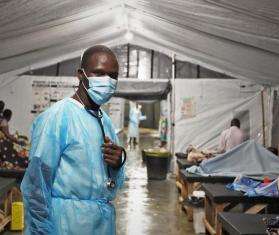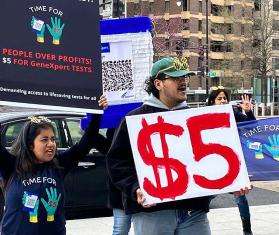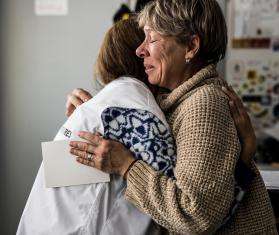On September 8, 2015, the Lasker Foundation announced that Doctors Without Borders/Médecins Sans Frontières (MSF) has received its annual Lasker-Bloomberg Public Service Award, in recognition of our work in the Ebola-affected countries. Click here to read more from the Journal of the American Medical Association.
The following remarks were delivered by Dr. Joanne Liu, MSF's international president, at the ceremony in New York City on September 18, 2015, during which the Lasker Foundation presented MSF with the award:
Our work in West Africa—recognized by this Lasker-Bloomberg award—would not be possible without the selfless determination and dedication of our staff—particularly our national staff from the Ebola-affected countries.
Through countless acts of courage, more than 4,000 men and women have cared for Ebola patients in West Africa. Alongside some 1,300 international workers, they have fought daily for 18 months.
Fourteen of them tragically lost their lives. It is in their cherished memory that I accept this award.
MSF’s response, while generating many accolades, ultimately illustrates an appalling, systemic failure.
There have been 24 Ebola outbreaks since its discovery 40 years ago. Yet, in this latest one, people were literally dying at our feet, for lack of treatments, vaccines, or point-of-care diagnostics.
Yes, the world mobilized. But only after a handful of Ebola cases emerged in the west. And rather than initially focusing on the source of the epidemic, and attending to the core medical needs of those most affected, measures were enacted to protect borders and trade.
The international epidemic response system is simply not working.
There are no interventions for a number of regularly occurring epidemics. Measles is today ravaging parts of the Democratic Republic of Congo. It, along with cholera, meningitis, and other vaccine-preventable diseases, claim thousands annually. This is MSF’s daily field reality.
Ebola has only reinforced the fact that global health security cannot be disconnected from individual health security. Global health security requires putting those most at risk at the center of any epidemic response. Enforcing quarantines and imposing travel bans only exacerbate outbreaks.
Ebola also exposed a global research and development infrastructure that is unfit for purpose: saving lives.
We should be conducting safety studies and agonizing over ethical frameworks during inter-epidemic phases. This would allow fast-track use of experimental drugs and vaccines during an outbreak—and efficiency trials as an epidemic peaks. Yet, all too often, we scramble to act only as an epidemic peters out. We lost critical months during Ebola.
We must act upstream of epidemics, not at the tail end. Lives are lost by the failure to manage R&D drivers and timelines.
Just as a global health security response must be guided by the actual needs of actual patients, so too must biomedical research.
The Lasker awards testify to the tremendous strides made in medical science.
Yet, the alarming gaps in R&D on emerging infectious and neglected diseases, even anti-microbial resistance, leave patients facing the greatest disease burdens by the wayside.
We can launch satellites into deep space. Yet we can’t handle a virus, be it Ebola, flu, or SARS.
How is this possible—today—in the twenty-first century?
I am utterly convinced that R&D can be a game changer in preparing for the next epidemic.
Innovative solutions, along with radical new thinking, are required.
For Ebola, MSF is supporting the creation of a network of biobanks. Roughly one hundred thousand blood samples collected by a number of foreign laboratories can be used for R&D on Ebola diagnostics, treatments, and vaccines.
On the ground, so many have done so much to fill the massive gaps. So many have perished.
Their deaths must rally us to act before epidemics or new threats explode. R&D must be redesigned to ensure that medical advances benefit those with the most acute needs. This can in part be achieved with a global fund for R&D.It is precisely in this domain that you, here today, can make a unique difference.
Thank you."



